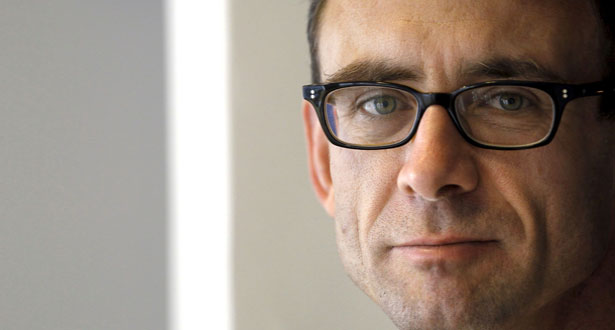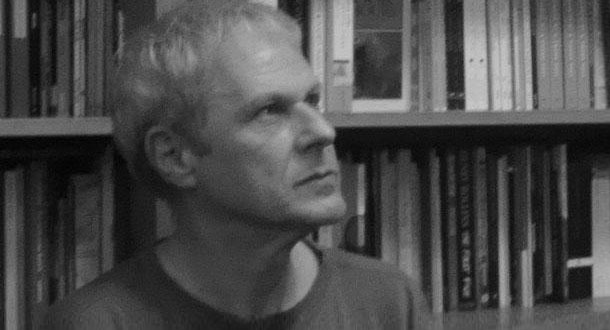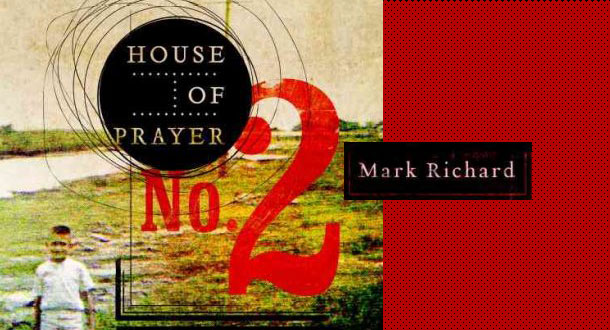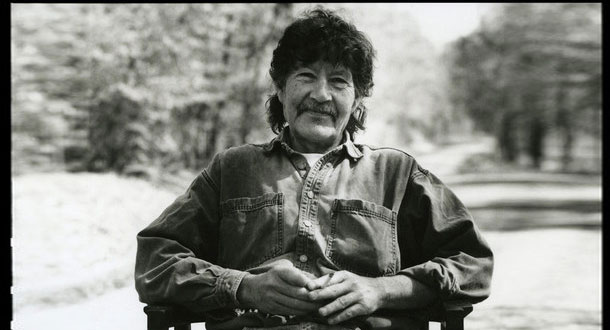In Nik Korpon's new novel, The Rebellion's Last Traitor, the world is ravaged by environmental collapse. Memory is bought, sold, and experienced like a drug. One man is fighting to discover the truth about what happened to his wife and child. It's classic Korpon: Smart, challenging, beautifully-written, and heartbreaking. I've known Nik for a long time, and I've always really dug his writing, but this definitely feels like a leap forward. Most importantly, he takes a lot of stuff that might become convoluted in the hands of another writer, and really narrows things down to the beating human heart of the story.
To mark the release, Nik and I talked about Blade Runner, audiobook pronunciation, and most importantly, how he comes up with so many crazy sci-fi style names (a process that I'm fascinated by). Read this interview. Then buy the book. Dude has kids to support!
What attracted you to sci-fi on this one?
It wasn't intentional. Originally it was way more dystopian. Then after talking to a then-prospective (now current) agent, she said dystopian was a pretty hard sell and asked if I'd thought about making it more sci-fi because it lent itself to that. Initially, I was pretty nervous about it because I'd never written anything I'd call straight-up sci-fi—though I still think Traitor is a mystery novel in a sci-fi world—but I figured I'd give it a shot. And everything evolved organically from there. As we developed character and narrative, I kept adding little bits of texture to the world until it became what it is in the novel.
All that said, despite thinking of myself primarily as a crime/mystery writer, having the freedom to go nuts on the page was really liberating. I think I have a lot of the same tendencies that you do, in that I take a sideways approach to crime stories. Whereas your Ash books take a more kinetic and off-kilter slant, I think a lot of my short stories take an off-kilter-veering-into-weird slant. So using a mystery narrative but having the liberty to make the world whatever I wanted it to be was really nice. It probably doesn't read as very out-there, but it felt that way to me.
Being primarily a crime guy, what did you look to for inspiration?
Some China Miéville books, Altered Carbon by Richard K. Morgan, and Axel Taiari's short stories, then films/TV like Ex Machina, Black Mirror, Blade Runner, stuff like that. Anything that took established narratives and really flipped them. Miéville's books are great for that, but they also require a ton of mental energy because he's doing a lot of things within the sentences. I highly recommend Altered Carbon, Adam Christopher's Made to Kill, and Stephen Graham Jones's Mongrels as great examples of how you can slip one genre into another. Also, The X-Files was a big influence, both on this book and overall. When I describe the book, I keep saying, "It's sci-fi, but more X-Files and less Star Wars."
Eitan City. Tathadann. Aífe. Henraek. Forgall. Nahoeg. Where do you come up with all your wonderful character and place names for a series like this? How do you keep them all straight? What's the process there?
Notes. Lots and lots of notes. (Kidding but also REALLY not kidding.)
Henraek and Walleus were originally Henrik and Wallace, named after Henrik Larsson, a famous striker for Celtic FC and Barcelona, among others, and Jock Wallace, who was one of the preeminent coaches for Rangers FC. To take a step back, in the early stages, I had a general idea of the book but couldn't find my way in to the heart of it to figure out what it was all about. I needed a break to think, so I ended up watching a Vice documentary about the Old Firm, which is a football rivalry between Celtic (one of my two favorite clubs, alongside Barcelona) and Rangers in Glasgow. Seeing the divisions within the city, the way people are—to outsiders—arbitrarily divided and becoming mortal enemies but completely devoted to their own side, it was like watching the book play out in front of me. So it seemed natural to name the two protagonists after Celtic and Rangers people. From there, it just all added up. I read a lot of books about mythology when I was a kid (is it a surprise I didn't have many friends?) and once I had the Celtic/Rangers aspect, it seemed natural to draw on those.
I'm also really interested in learning languages, as anyone who is Facebook friends with me unfortunately knows. So it seemed like a natural step to imbue the world with more authenticity by creating fictional languages for the various people that are based on actual languages. In Eitan, which is "Irish," everything is based of the Irish language and mythology. Nahoeg (their version of heaven/the afterlife) comes from Tir na nÓg. The Tathadann came from Tuatha Dé Danann, which were kind of a superior race in the Otherworld who rarely interacted with the Formorians, who were seen as the destructive side of human nature. Morrigan is a queen who foretells doom and death in battle. I think Macha (a rich neighborhood in Eitan) was one of the Morrigan sisters. So, you know, there's still a lot of my Marxist class warfare issues coming through. A lot of it came from stuff like that. Some of it is derivations of Irish, some just Irish (amadan means asshole, according to Google translate). And some I just made up.
What I joke about now—but not during writing—were the long, labored emails I sent my agent about how I was trying to delineate between the regions everyone came from by using the appropriate diacritic marks (like the Swedish ö and å for the people who came from the far north and the Danish æ and ø for people who were from not-so-far north) but that some of them looked cooler on the page than others which would make it inconsistent but, really, the Danish alphabet is the same as the Norwegian one so they were geographically similar and and and. To which she saintly replied: It's just a book.
That was a really complex answer for a simple question. Like I said, is it any wonder I didn't have many friends?
Spinning off that—there's a lot of world-building here. How much of that do you need on the page starting out, versus what you make up on the fly?
Most of it was organic. At some point, we hit on the concern that the book might be looked at as too didactic (I think there were more of my socio-political rants at that point) and a cautionary tale about the state of the US—which is kind of funny now, since I wrote a novel about a ragtag group of rebels fighting to take down a totalitarian regime led by an oligarch who inherited the throne. So we moved the book from a post-Katrina-New Orleans-but-worse to an amorphous UK/Ireland setting, since soccer also plays a role in the story and aspects of the narrative were loosely inspired by the Easter Rising of 1916. That changed a bit of the flavor of Eitan City, especially the countryside that exists outside the city (which was present in earlier drafts but not in the final, but which shows up again in Queen of the Struggle). Then, as I mentioned previously, it was built up brick by brick. Like you, I'm an underwriter—as you've mentioned in the past—so a lot of that texture and detail doesn't come into play until the structure of the book is sound.
You're planning a sequel, right? Can you give us a bit of a tease about that?
It's hard to say much without giving anything away, but: You'll see the lands and people who are mentioned in Traitor but not really shown. There's a bunch of stuff drawn from Refused and other leftist punk bands I listen to, as well as some veiled (I hope) Marxist musings/critiques. There's still more soccer (much to Livius Nedin's chagrin). There are more weird, old gods mentioned. A metric shit-ton of stuff blows up. And a fair amount of people die. Oh, and more dick jokes. So yeah, it's a normal Nik Korpon novel.
There's a definite Blade Runner vibe here. I do not like Blade Runner. Am I wrong?
Yes. Yes, you are.
What am I missing? Some of the concepts are pretty cool and I really like the ending but the movie also strikes me as a little dull. Why is to so enduring?
I think it's the combination of the old noir meets future dystopian set design, the cinematography, the moodiness, the Daryl Hannah, plus all the thoughts about identity and human nature, stuff I tend to obsess about in books. It's definitely slow at points, but I love it.
You mentioned talking to someone from Recorded Books about pronunciations. Can you tell us a little about that process? When the narrator for New Yorked called me and asked me for any tips, I told him something like, "I dunno, do a good job?" I had nothing to add since it was all there on the page. But when you've got a book like yours, I imagine there's more that goes into it...
It was... interesting. I'd had a ton of conversations about the characters, and I could hear all the narration in my head, but I'd never actually verbalized those combinations of letters. It doesn't help that I don't speak any Irish and only speak a smattering of Swedish, so a lot of the pronunciation was kind of "I dunno, like *this* I guess?" Some of the words were really weird, especially Henraek's name, because I knew exactly how it was supposed to sound in my head but couldn't convey it to the guy from Recorded Books (who, it should be said, was really, really patient with me). I'd say it like HEN-rake, but with an e after the a, then he'd parrot it back and I'm like "Yeah, like that, but more like raek," which sounded right when I said it, then he'd say it exactly the same but it still didn't sound right. After I had a couple goes, I realized it didn't fucking matter because they were made-up names and no one had ever heard them before and we'd move on to the next of the seventy-some words on the list. I can only imagine what the convo for Queen of the Struggle will be like, since it's set in two countries, one of which has distinct urban and rural dialects.
I'm also realizing that all of this makes me sound like I'm insane.
The Rebellion's Last Traitor is out now from Angry Robot Books.

About the author
Rob Hart is the class director at LitReactor. His latest novel, The Paradox Hotel, will be released on Feb. 22 by Ballantine. He also wrote The Warehouse, which sold in more than 20 languages and was optioned for film by Ron Howard. Other titles include the Ash McKenna crime series, the short story collection Take-Out, and Scott Free with James Patterson. Find more at www.robwhart.com.

.jpg)




